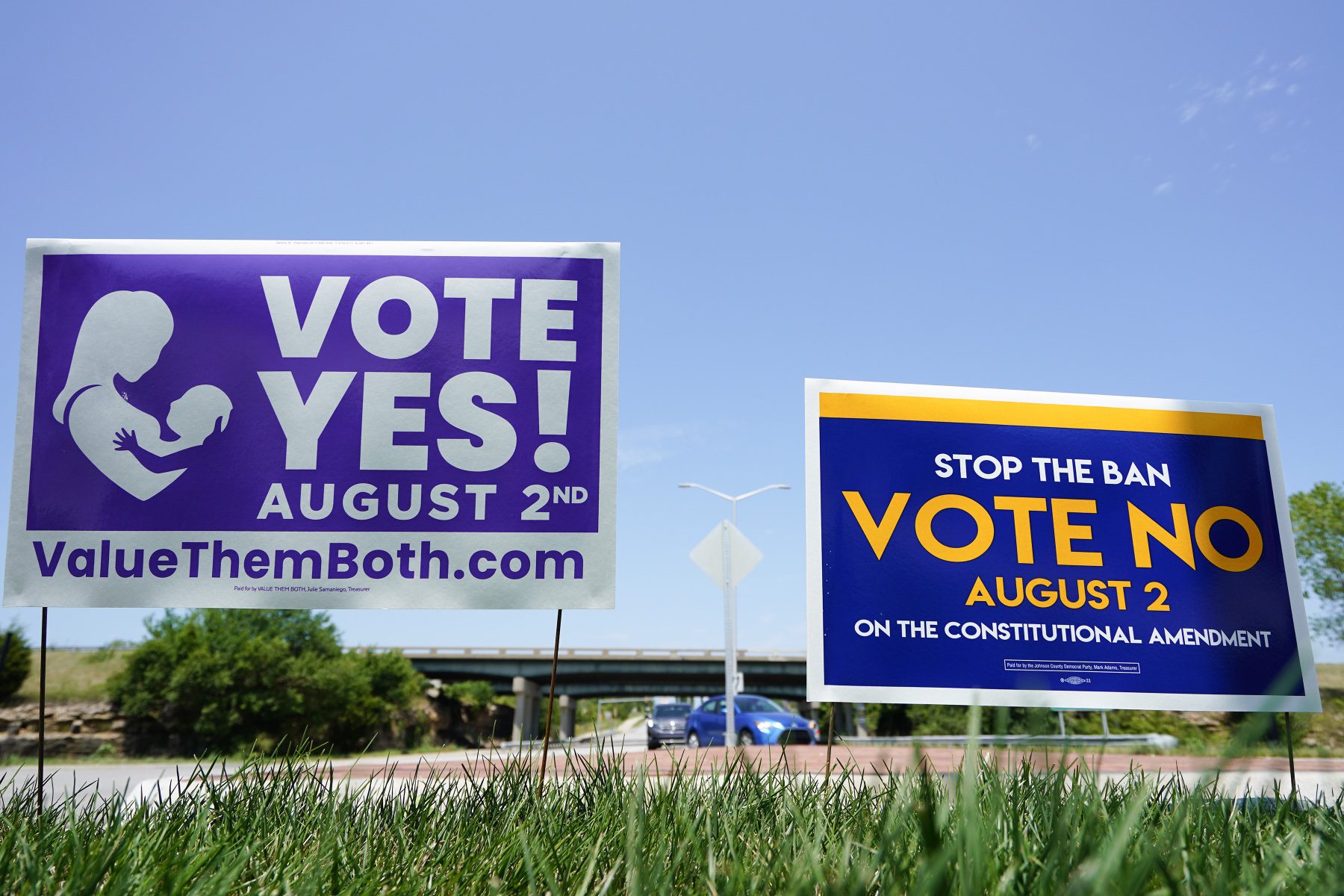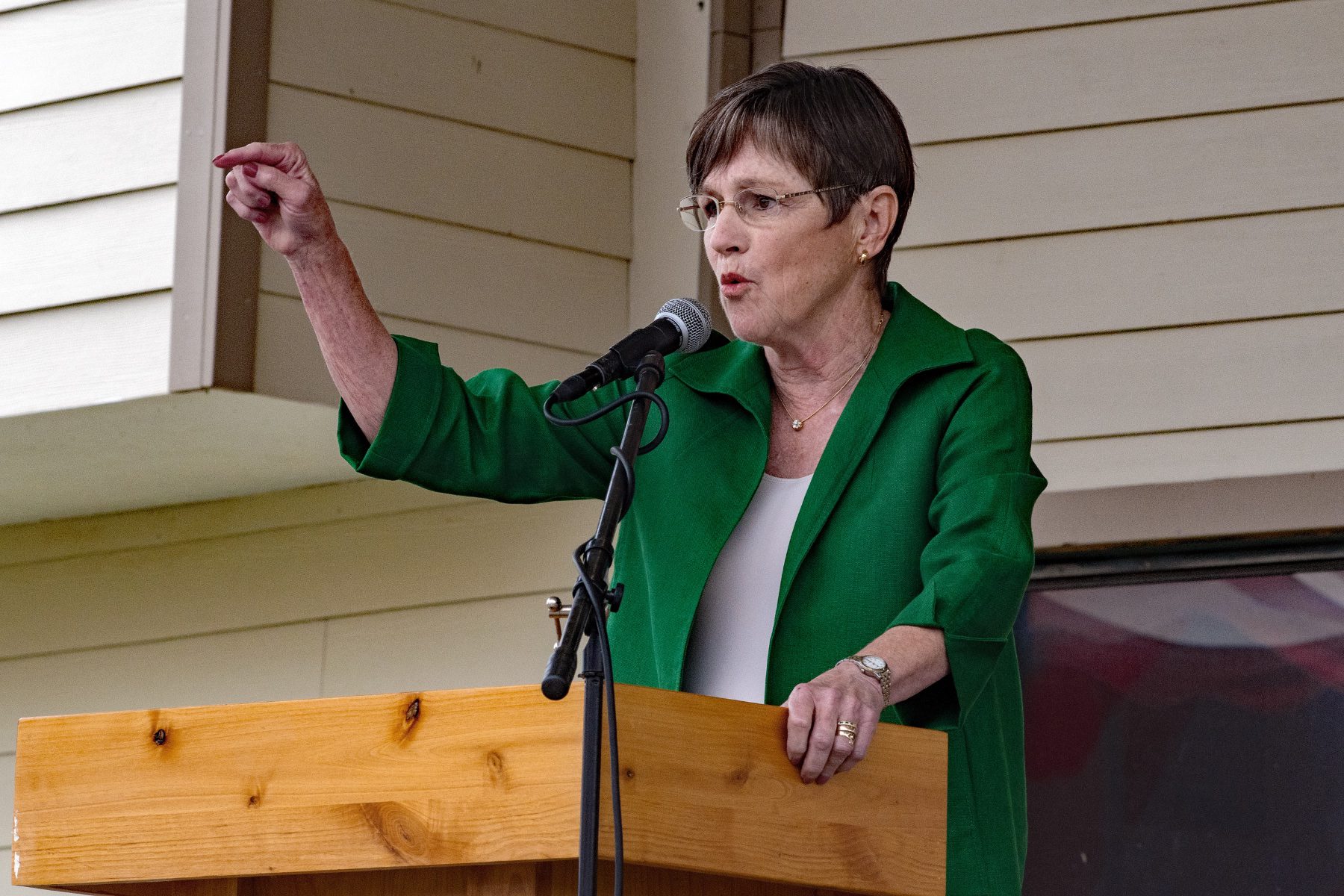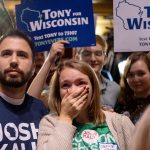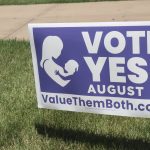After Kansas voters resoundingly rejected an anti-abortion ballot initiative, the state’s Democratic candidate for governor — incumbent Laura Kelly — is steadily avoiding mentioning the issue, despite the election’s massive implications for abortion access, and Kelly’s yearslong role as a stopgap against statewide abortion restrictions.
The August vote suggested to some nationwide analysts that the backlash to overturning Roe v. Wade — which has allowed states to completely ban the procedure — could transcend conventional politics, even in a state like Kansas, which swung for former President Donald Trump in 2020 by 15 points. But Kelly’s silence suggests that statewide Democrats don’t necessarily see it that way.
Kelly has been considered an ally by the state’s abortion rights groups and clinics, offering a steady veto against efforts to pass new restrictions on the procedure. In 2018, Kelly was endorsed by Planned Parenthood, and she’s backed this year by Emily’s List, a national organization that supports Democratic women who favor abortion rights.
Kelly’s opponent, state Attorney General Derek Schmidt, has long opposed abortion rights, and recently asked the state Supreme Court to reverse its position that Kansas’ constitution guarantees the right to terminated a pregnancy.
Pollsters and analysts have deemed the race a toss-up. Kelly was elected in 2018, amidst a national electoral wave for Democrats. Prior to her election, she served in the state senate. Her campaign did not respond to The 19th’s request for comment.
Both candidates have minimized their statements on abortion since August, with Kelly’s campaign saying after the vote she planned on focusing her reelection message on “the economy.” Schmidt has similarly focused on the economy, with his two campaign ads highlighting inflation and tying Kelly to President Joe Biden.
Whoever wins the gubernatorial race will govern alongside a legislature controlled by Kansas’ increasingly conservative Republican Party, and will have immense influence over abortion access. Kansas’ Supreme Court has held that the state constitution protects the right to an abortion, but the state could still pass restrictions that make it harder to access — instituting longer waiting periods, or requiring abortion providers to tell patients medication abortions can be reversed, a claim that has no scientific basis. (Kelly vetoed the latter type of legislation in 2020.)
“I think we’ll still continue to see plenty of open or subtle attacks — the whole range of anti-abortion legislation that they always try every year,” said Zachary Gingrich-Gaylord, a spokesperson for Trust Women, which operates an abortion clinic in Wichita. “We still have to remain vigilant on that front.”
Backlash to the Supreme Court overturning Roe v. Wade has energized Democratic campaigns across the country. Democrats’ likelihood of keeping control of the U.S. Senate has improved, and purple-state gubernatorial candidates are campaigning on protecting abortion rights. In Michigan, incumbent Gov. Gretchen Whitmer has made abortion rights a center of her reelection effort. Minnesota Gov. Tim Walz and Wisconsin Gov. Tony Evers — both also Democratic incumbents — have emphasized the issue, arguing that if elected, they will work to protect abortion rights.
But Kelly has avoided talking about abortion. The day Kansans voted down the amendment that would eliminate abortion rights, Kelly’s statement didn’t include the word “abortion”— saying instead that the results showed voters had “rejected divisive legislation that jeopardized our economic future & put women’s health care access at risk.”
When asked directly about abortion at a gubernatorial debate September 10, Kelly spoke briefly about the issue, saying that the results showed most Kansans “don’t want that government overreach in people’s lives.” But the bulk of the back-and-forth consisted of the candidate’s competing messages on the economy.
Campaign advertisements have focused on portraying Kelly as a centrist moderate. A week after the ballot initiative failed, she put out a TV spot emphasizing the recent repeal of a grocery tax. Her most recent ad showcased her “middle seat.”

“The middle is where I work with both parties to balance the budget, build a record surplus, fully fund our schools and eliminate the food tax,” Kelly said in the ad.
Part of that is the candidate herself. Unlike Michigan’s Whitmer, for instance, Kelly has never spent much time talking about abortion — despite her repeated role blocking proposed restrictions on the procedure.
“She doesn’t want to be talking about abortion not only because of the partisan stuff, but also because it’s not her brand,” said Kelly Dittmar, director of research at the Center for American Women and Politics. “Her brand isn’t, ‘I’m a progressive politician who’s going to fight for women’s rights.’”
Still, political analysts say Kelly’s relative silence is revealing about Kansas politics.
“Democrats who win in Kansas run essentially as moderate independents. They don’t put party affiliations on yard signs. They don’t tie themselves to national politics,” said Michael Smith, a political science professor at Emporia State University. “Laura Kelly comes right out of that mold and has these moderate, cautious instincts.”
Unlike other Democratic incumbents, Kelly needs to win over a substantial number of Republican voters, Dittmar noted. Many of those are people who may have voted for Kansas abortion rights in August, but they may not be moved by someone who makes it their core campaign focus.
“She is looking at how she can persuade voters who might otherwise vote Republican,” Dittmar said.
National surveys, including a recent 19th News/SurveyMonkey poll, show that Republicans are less likely to prioritize abortion as an election issue and are predominantly focused on the economy.
In the months since Roe v. Wade was overturned, Kansas has emerged as a major haven for abortion. With abortion banned in Texas and Oklahoma, increasing numbers are traveling north to Kansas to terminate their pregnancies. Trust Women’s Wichita clinic is seeing double the number of patients it did this time last year. More people visit the clinic’s website from Texas and Oklahoma than do people from Kansas, Gingrich-Gaylord said.
Abortion rights groups are feeling that urgency. Smith noted that Kelly can rely on organizations independent of her to campaign on the issue rather than having to do it herself. That’s already happening: Planned Parenthood Votes, the organization’s political arm, is planning to go door-to-door for Kelly, focusing on counties that rejected August’s anti-abortion ballot initiative, including Johnson County, the largest in the state. They will also launch digital advertisements and send direct mail supporting the Democratic incumbent.
Trust Women will not be endorsing a candidate or putting out ads, but volunteers will also go door-to-door and put out a voter guide clarifying what each candidate’s views are on abortion.
“My best guess on why you’re not hearing a strident pro-choice message from Gov. Kelly is she’s outsourcing it to the independent groups,” Smith said.






